ReactiveX
-
Reactive Prgram은 Observer, Iterator, Functional Programming을 결합한 비동기 프로그래밍이다.
-
일반적인 명령형 프로그램이 아닌 데이터의 흐름을 먼저 정의하고 데이터가 변경되었을 때 연관되는 연산자를 통해 처리되는 방식을 Reaxtive Programming이라고 한다.
-
즉 필요에 의해 데이터를 요청하여 가공하는 것(절차형)이 아닌, 데이터를 관리주체하는
Observable에 데이터 변경시 요청을 받을 수 있도록 subscribe하여 변경사항을 전달하는 방식이다. -
데이터의 흐름, 스트림을 만드는
Observable- 스트림을 만드는 일을 누가 할것인지 지정하는
subscribeOn
- 스트림을 만드는 일을 누가 할것인지 지정하는
-
흐름, 스트림에서 데이터를 처리하는
Subscribe- 스트림에서 데이터를 누가 할 것인지 지정하는
observeOn
- 스트림에서 데이터를 누가 할 것인지 지정하는
-
Obserable은 데이터를 제공하는 생산자의 역할을 하여 3가지의 행동을 한다.
- onNext - 새로운 데이터를 전달
- onCompleted - 스트림의 종료
- onError - 에러 신호를 전달
환경
작업툴
- IntelliJ IDEA Community Edition 2020.3 x64
dependency
implementation ("io.reactivex.rxjava3:rxjava:3.0.9");
implementation ("io.reactivex.rxjava3:rxkotlin:3.0.1");Observable
- 이벤트 발행하는 주체
- Type
- Observable - 최상위 기본타입
- Single - 1개의 데이터만 반환 (null 반환시 예외 발생)
just를 사용하면 데이터를 1개만을 입력할 수 있다
- Maybe - Null 가능성이 있는 1개의 데이터 반환 + Single
- Completable - 반환값 없이 처리 후 종료
- Flowable - Backpressure 지원, Observable의 발행과 구독의 속도차이를 조절
Observable
.just("a", "b", "c", "d", "e") //Observable 내부에 값을 순서대로 전달
.subscribe { //5번의 onNext로 전달됨
println(it) //Observable, 스트림으로 부터 데이터를 subsribe하여 출력
}
just는 매개변수 순서에 맟춰서 데이터를 발행한다.
-
subscribe는 발행된 데이터를 처리하는 로직이 작성된다.
-
subscribe는 다음과 같이 오버로딩되어 있다
public final void subscribe(@NonNull Observer<? super T> observer)
public final Disposable subscribe(@NonNull Consumer<? super T> onNext)
public final Disposable subscribe(@NonNull Consumer<? super T> onNext, @NonNull Consumer<? super Throwable> onError)
public final Disposable subscribe(@NonNull Consumer<? super T> onNext, @NonNull Consumer<? super Throwable> onError,
@NonNull Action onComplete) - 각 상황에 맞게 데이터를 처리, 에러처리, 완료 후 처리를 정의할 수 있다.
Action은Runnable과 같이 매개변수가 없고 반환타입도 없다.실행 메서드도
run()인 함수형 인터페이스이다.
Observable 구독
Subscribe 신청
-
subscribe메서드를 이용하여 발생된 데이터를 구독할 수 있다. -
구독하는 방법에는 두 가지가 존재한다.
-
Observer 객체를 생성
-
객체가 아닌 사용자가 필요한 함수형 인터페이스만을 지정
-
1. Observer 객체를 생성
- Observable 주요 콜벡 메서드
- onSubScribe(d : Disposable) : 구독을 신청하면 처음 호출됨
- onNext(item : T) : 값을 발행할 때 호출하여 값을 넘겨줌
- onError(e : Throwable) : Observable에서 에러 발생시 호출
- onComplete() : 모든 값이 발행하면 호출
- 메서드를 오버라이딩하는 작성하는 번거로움이 있지만 재활용할 수 있다는 점에서 이점이 있다
val observer :Observer<String> = object : Observer<String> {
override fun onSubscribe(d: Disposable?) {
println("onSubscribe")
}
override fun onNext(t: String?) {
println("onNext = ${t}")
}
override fun onError(e: Throwable?) {
println("onError = ${e}")
}
override fun onComplete() {
println("onComplete")
}
}
Observable.just("a", "b", "c", "d", "e").subscribe(observer)
//결과
//onSubscribe
//onNext = a
//onNext = b
//onNext = c
//onNext = d
//onNext = e
//onComplete2. 함수형 인터페이스 지정
- Observable클래스에는 subscribe 메서드과 다음과 같이 오버로딩되어 있다.
public final void subscribe(@NonNull Observer<? super T> observer) //Observer 객체를 생성해서 구독하는 방법
public final Disposable subscribe(@NonNull Consumer<? super T> onNext)
public final Disposable subscribe(@NonNull Consumer<? super T> onNext, @NonNull Consumer<? super Throwable> onError)
public final Disposable subscribe(@NonNull Consumer<? super T> onNext, @NonNull Consumer<? super Throwable> onError,
@NonNull Action onComplete) Observable.just("a", "b", "c", "d", "e")
.subscribe ({
println("onNext")
},{
println("onError")
},{
println("onComplete")
})Subscribe 해지
-
구독해지에는 몇가지 방법이 존재한다.
-
구독시 observer객체를 넣어 해당 객체에
Disposable과 관련된 로직을 정의한다. -
Disposable를dispose()를 이용하면 구독이 해지된다.
1. Observer 객체를 이용한 구독해지
- observer객체 내부에
Disposable타입 객체를 선언하고 end데이터가 삽입되면 구독해지 되도록 설정하였다.
val observer: Observer<String> = object : Observer<String> {
lateinit var disposable : Disposable
override fun onSubscribe(d: Disposable?) {
println("onSubscribe")
if (d != null) {
disposable = d
}
}
override fun onNext(t: String?) {
if(t == "end"){
disposable.dispose()
println("subscribe dispose")
}
println("onNext = ${t}")
}
override fun onError(e: Throwable?) { }
override fun onComplete() { }
}
Observable.just("a", "b", "c", "d", "end", "e")
.subscribe(observer)
//결과
//onSubscribe
//onNext = a
//onNext = b
//onNext = c
//onNext = d
//subscribe dispose
//e가 출력되지 않음2. Disposable 객체를 이용한 구독해지
subscribe한 후disposable타입의 객체를dispose해준다
val disposable = Observable.interval(100, TimeUnit.MILLISECONDS)
.subscribe {
println("onNext = ${it}")
}
Thread.sleep(2000)
disposable.dispose()
println("main end")
//결과
//...
//onNext = 17
//onNext = 18
//main end3. CompositeDisposable
- CompositeDisposable 객체를 생성하여 add() 메서드를 이용해 다수의 disposable객체를 담아 한번에 해지할 수도 있다.
- 내부적으로 OpenHashSet으로 disposable객체를 담고 있다.
val compositeDisposable= CompositeDisposable()
val disposable = Observable.interval(100, TimeUnit.MILLISECONDS)
.subscribe {
println("onNext = ${it}")
}
compositeDisposable.add(disposable)
Thread.sleep(2000)
compositeDisposable.clear()
Thread.sleep(2000)
println("main end")
//결과
//...
//onNext = 17
//onNext = 18
//main endObservable 생성 메서드
Create
- just()는 선언 요소들을 순서대로 발행하지만 create는 직접 onNext를 호출하여 발행해야한다.

Observable.create<Int>{ //it:ObservableEmitter<Int!>!
it.onNext(10) //값을 발행
it.onNext(20)
it.onNext(30)
it.onComplete() //발행 종료
}.subscribe({
println(it)
},{
println(it)
})- ObservableEmitter는 onNext, onError, onComplete를 의미함
Just
- 받은 인자를 차례대로 순서에 맟춰서 발행하는 Observable을 생성
- 최대 10개까지 입력을 받을 수 있음
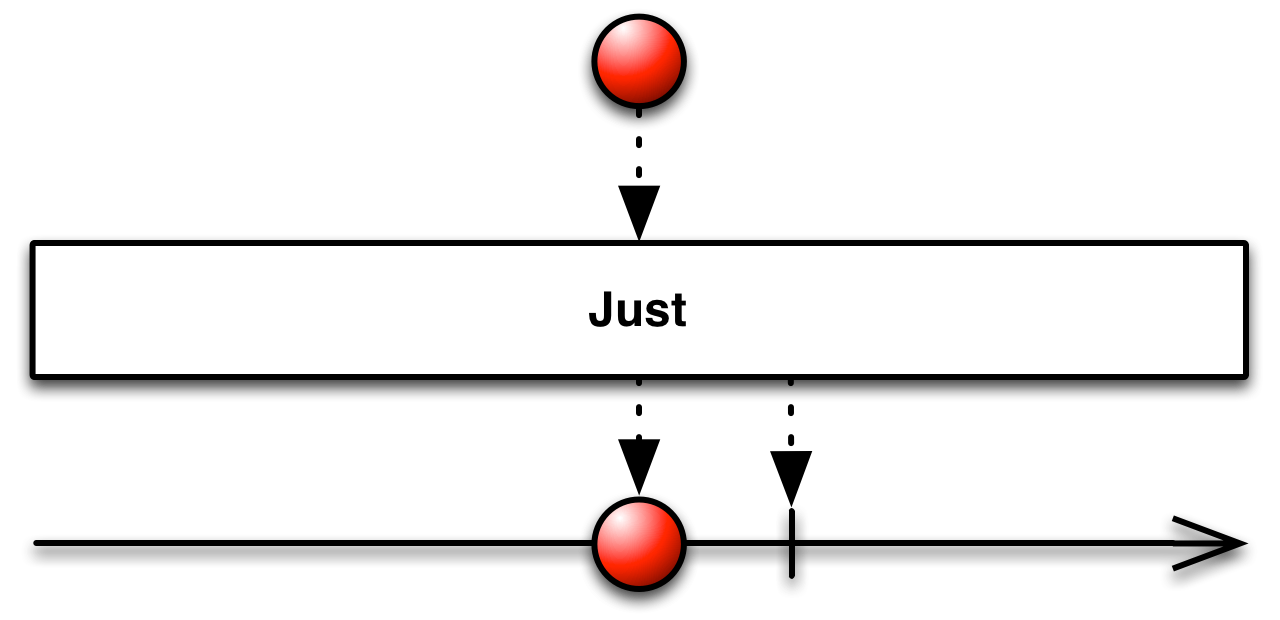
Observable.just("a", 1, "string", 10.5)
.subscribe({
println(it)
},{
println(it)
})Range
- 주어진 n지점부터 m 번까지 카운트한 Integer타입 데이터를 발행

Observable
.range(5, 10)
.subscribe({
println(it)
},{
println(it)
})- m번까지 출력이 아닌 m번카운트 하는 것이기 때문에 마지막 데이터는 14가 된다.(그림참고)
Empty, Never, Throw
- Empty는 데이터가 없는 Observable

- Never은 데이터가 없고 발행의 끝이 없는 Observable

- Throw는 데이터가 없고 에러로써 발행이 종료되는 Observable

Interval
- 지정된 시간 간격에 따라 정수값을 발행하는 Observable
- 해당 Observable은 무한하게 오름차순으로 정수를 발행한다.

Observable.interval(100, TimeUnit.MILLISECONDS)
.take(5) //5개 까지만 발행
.subscribe({
println(it)
}, {
println(it)
})
//출력은 0, 1, 2, 3, 4- 정수는 0부터 시작되고 타입은 Integer
Hot, Cold Observable
- Observable은 구독을 신청하면 데이터의 순서에 맞게 데이터를 발행해준다.
- 여러번 subscribe를 해도 처음 순서대로 동일한 데이터를 보내주는 방식을
Cold Observable이라 한다.- web 요청, DB 요청
- 반변에 데이터의 발행 시점이 구독시점이 아니여서 이전에 발행된 데이터를 받지 못하는 방식이
Hot Observable이다.- 센서값
- 강물과 같이 이미 흘러간 물을 받을 수 없는 것과 같다
ConnectableObservable
Hot Observable중 하나로connect()메서드를 호출하면 발행을 시작하는 Observable이다.publish()메서드로 기존Cold Observable이Hot Observable이 된다.
val connectableObservable = Observable.interval(100, TimeUnit.MILLISECONDS).publish()
connectableObservable.subscribe { println("1 Observer = ${it}") }
connectableObservable.connect()
Thread.sleep(200)
connectableObservable.subscribe { println("2 Observer = ${it}") }
Thread.sleep(200)
//결과
//1 Observer = 0
//1 Observer = 1
//2 Observer = 1
//1 Observer = 2
//2 Observer = 2connect()메서드 호출전에 미리 구독한1 observer은 0부터 데이터를 발행받는다.- 하지만 이후에 구독한
2 observer는 1부터 데이터를 받기 시작한다.
Subject
- Subject는 Oserver와 Observable과 같이 행동하는 프록시다.
- 왜냐하면 Subject는 Oserver이기 때문에 하나 이상의 Observable을 구독하거나 동시에 Observable이기 때문이다.
- 또한 하나의 Subject가 둘 이상의 Observable를 구독하면서 Cold Observable를 Hot Observable로 만들기도 한다.
- Subject는 Observer를 구현한 추상메서드이다.
Subject 종류
AsyncSubject
- AsyncSubject는 Observable로 부터 발행된 마지막 값을 발행하고 Observable의 동작이 완료된 후 동작한다.
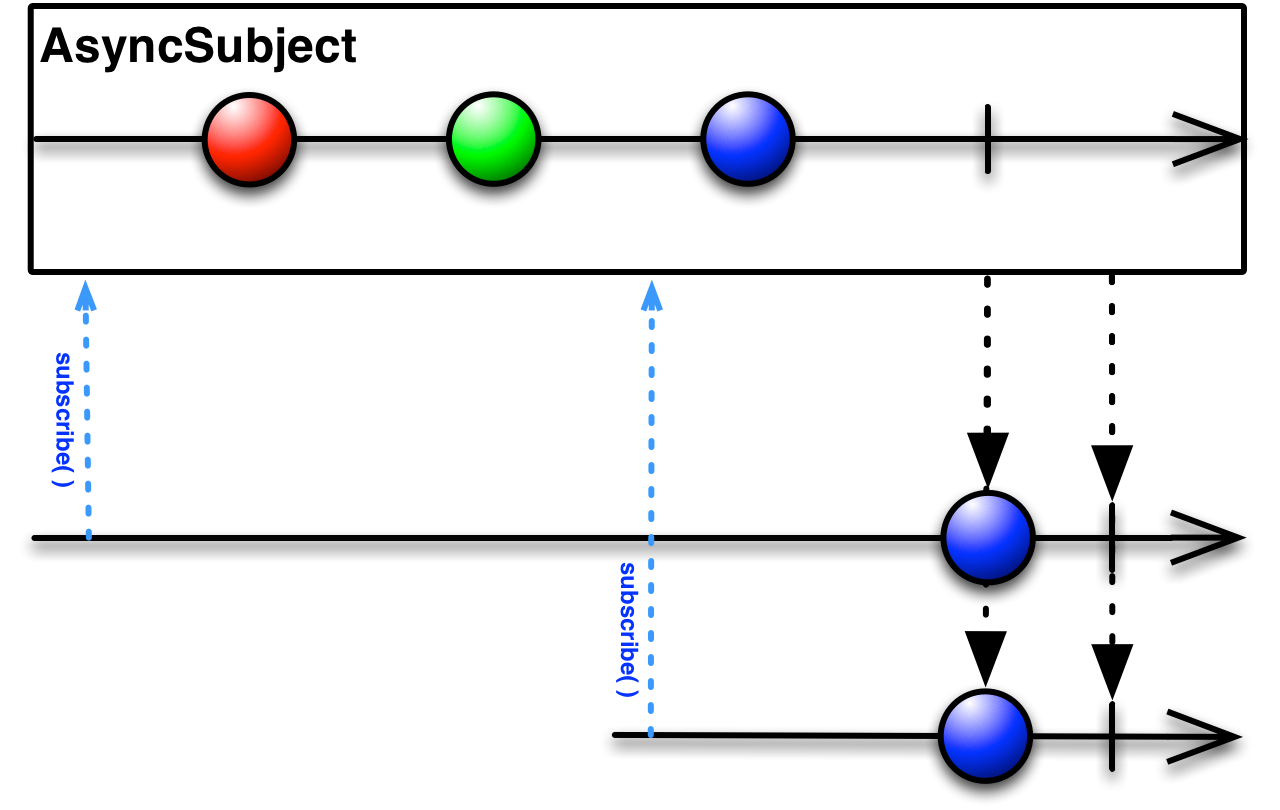
- 또한 마지막 값이 에러가 발생된다면 observer는 아무 데이터도 발행받지 못하고 오류를 그대로 전달한다.
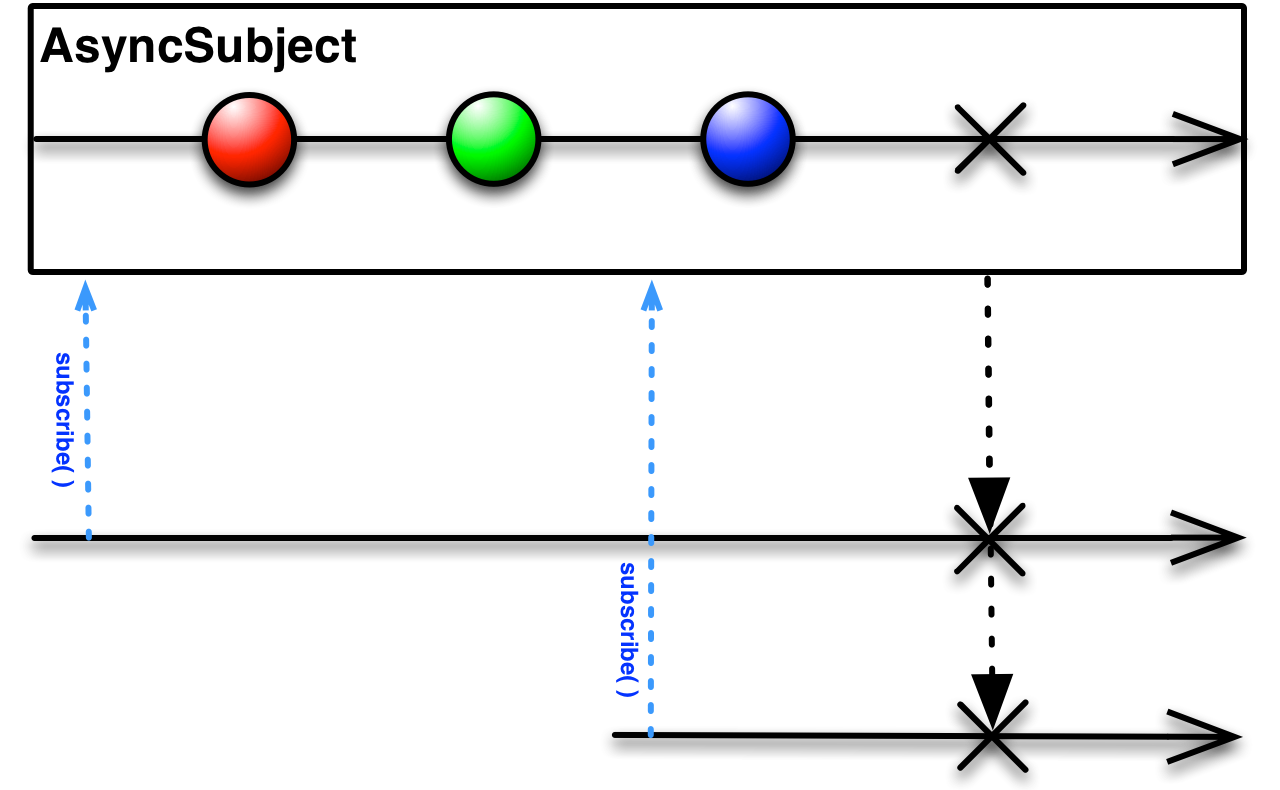
val observable = Observable.range(1, 10) //1부터 10번 카운트하여 정수값을 발행
val asyncSubject = AsyncSubject.create<Int>()
observable.subscribe(asyncSubject) //Subject는 Observer를 구현한 추상메서드라서 Observer타입의 매개변수가 될 수 있다.
asyncSubject.subscribe { println("1 observer = ${it}") }
Thread.sleep(1000)
asyncSubject.subscribe { println("2 observer = ${it}") }
//결과
//1 observer = 10
//2 observer = 10BehaviorSubject
- observer가 BehaviorSubject를 구독하기 시작하면 Observable이 가장 최근에 발행한 항목의 발행을 시작한다.
- 만약 아직 아무것도 발행하지 않았으면 기본값을 발행 후 이후에 발행된 데이터를 처리한다.
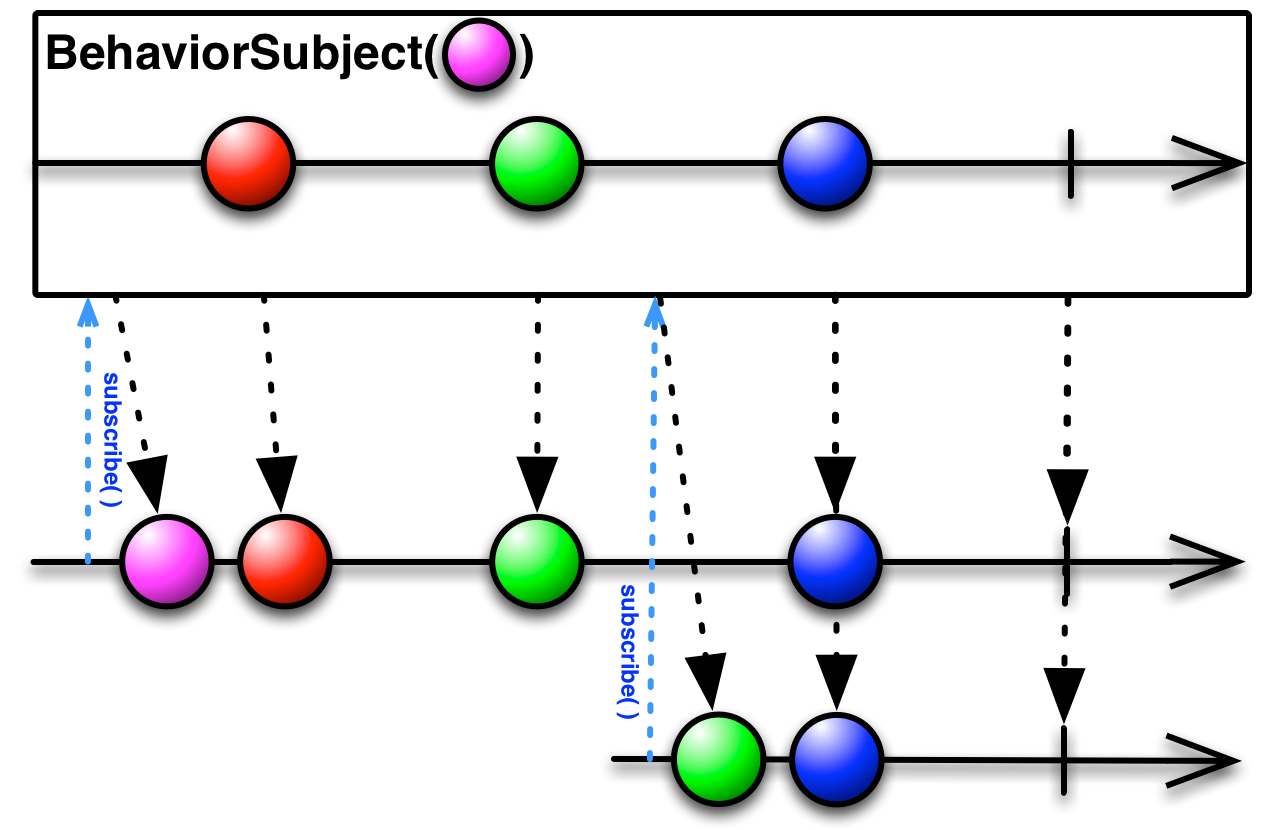
1번째 observer가 구독할 시점에는 발행된 데이터가 없어서 기본 데이터 발행
2번째 observer가 구독할 시점에 최신 데이터는 녹색이므로 녹색 데이터가 발행됨
- 오류 때문에 종료된다면 이후 구독하는 observer는 아무런 데이터를 받지 못하고 발생된 오류를 받는다.
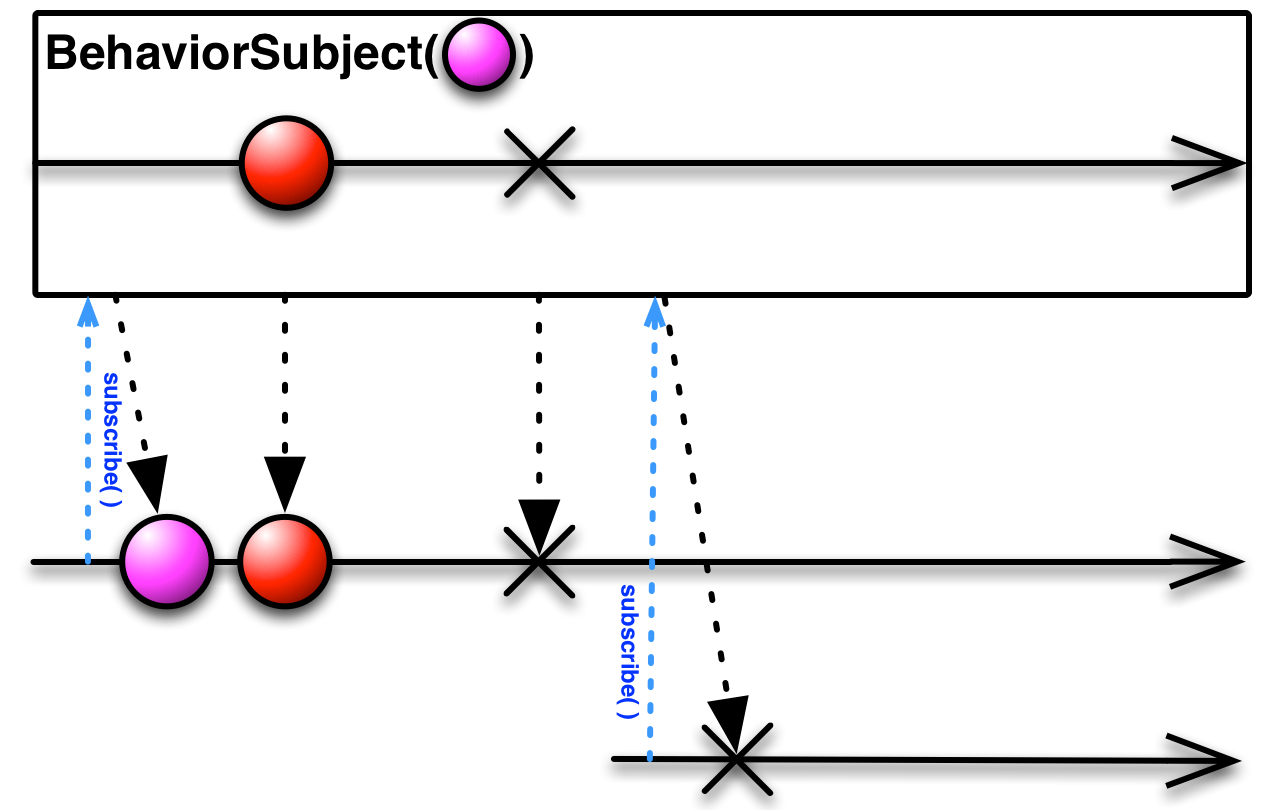
val behaviorSubject = BehaviorSubject.createDefault(0)
behaviorSubject.subscribe { println("1 observer = ${it}") }
behaviorSubject.onNext(100)
behaviorSubject.onNext(200)
behaviorSubject.subscribe { println("2 observer = ${it}") }
behaviorSubject.onNext(300)
behaviorSubject.onNext(400)
//결과
//1 observer = 0 //구독시점에서 발행된 데이터가 없어서 기본값을 받음
//1 observer = 100
//1 observer = 200
//2 observer = 200
//1 observer = 300
//2 observer = 300
//1 observer = 400
//2 observer = 400PublishSubject
- PublishSubject는 구독 이후에 발행된 데이터만 발행한다.
- PublishSubject는 생성시점에서 즉시 데이터를 발행하는 특성이 있기 때문에 생성시점에서 observer가 해당 subject를 구독하기 시작하는 사이에 데이터를 발행할 수 있다.
- 그렇기 때문에 Observable이 발행하는 모든 데이터를 보장받기 위해서는
Create메서드를 이용하여 명시적인Cold Observable로 생성해야 한다. - 혹은 ReplaySubject를 사용해야 한다.
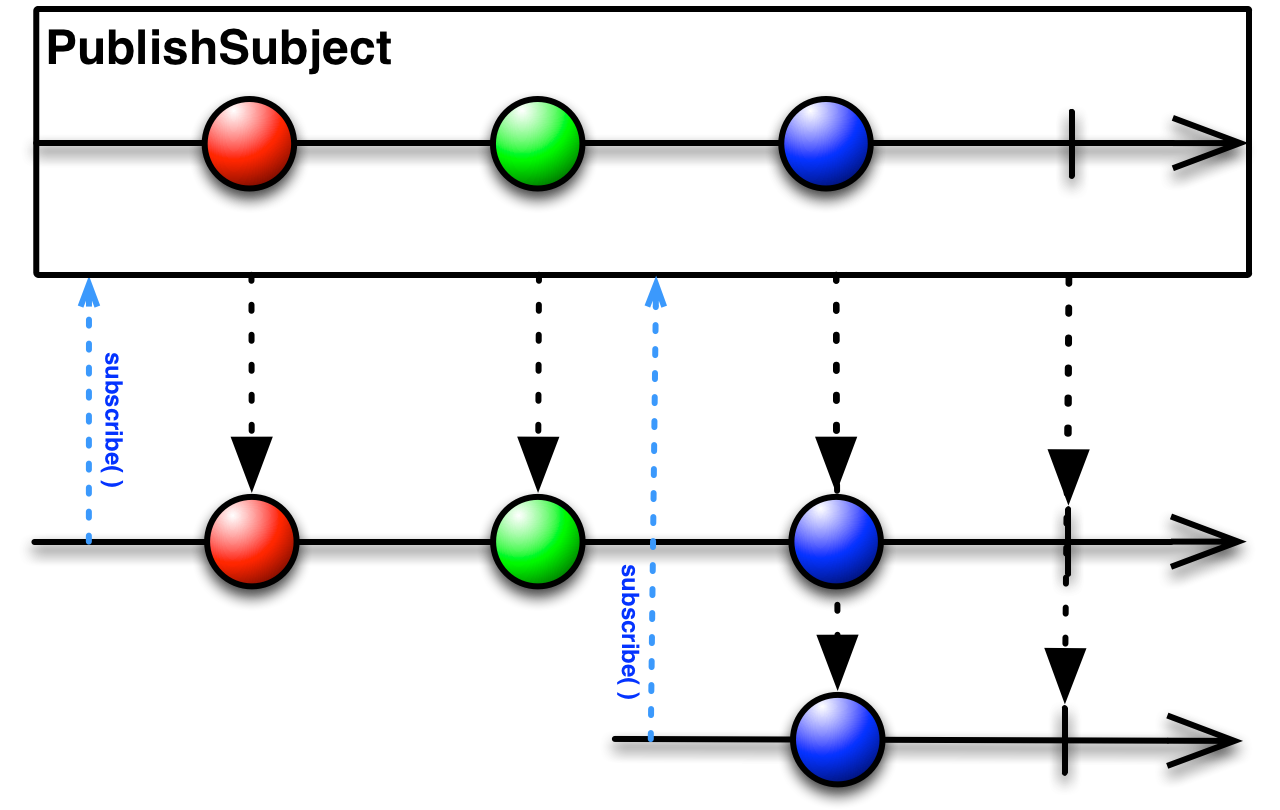
val observable = Observable.interval(100, TimeUnit.MILLISECONDS)
val publishSubject = PublishSubject.create<Long>()
observable.subscribe(publishSubject)
publishSubject.subscribe { println("1 observer = ${it}") }
Thread.sleep(200)
publishSubject.subscribe { println("2 observer = ${it}") }
Thread.sleep(200)
//결과
//1 observer = 0
//1 observer = 1
//1 observer = 2
//2 observer = 2
//1 observer = 3
//2 observer = 3ReplaySubject
- ReplaySubject는 Observer가 구독을 시작한 시점과 관계 없이 이전에 배출된 모든 데이터를 observer에게 발행한다.
- ReplaySubject의 생성자 오버로드를 통해 버퍼의 크기가 특정 이상으로 증가할 경우 처음 발행된 데이터를 지정된 시간이후 삭제하게 된다.
- ReplaySubject를 Observer로 사용할 경우 멀티스레드 환경에서는 비순차적 호출을 유할시키는 메서드는 사용하지 않도록 해야한다.
[Observable 계약](ReactiveX - The Observable Contract)
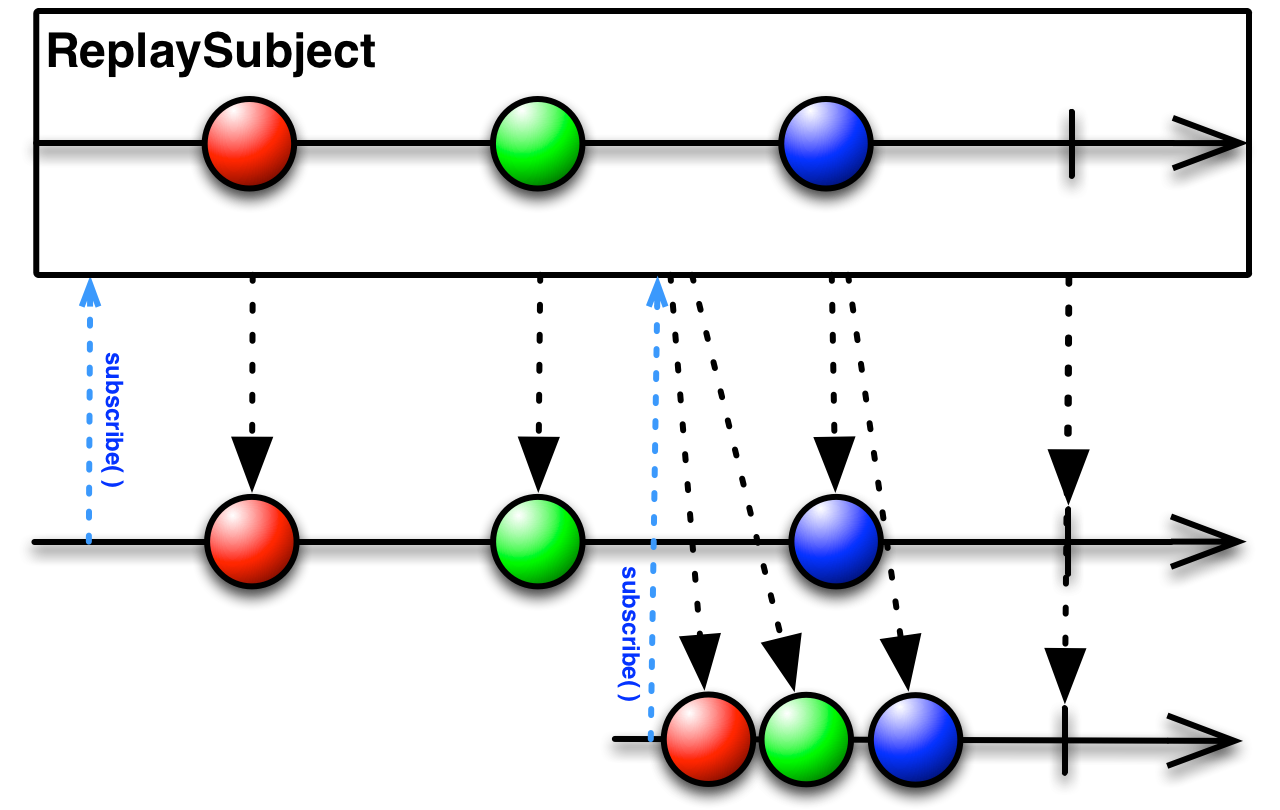
val replaySubject = ReplaySubject.interval(200, TimeUnit.MILLISECONDS)
replaySubject.subscribe { println("1 observer = ${it}") }
Thread.sleep(500)
replaySubject.subscribe { println("2 observer = ${it}") }
Thread.sleep(500)
//결과
//1 observer = 0
//1 observer = 1
//1 observer = 2
//2 observer = 0
//1 observer = 3
//2 observer = 1Operator
- Operator는 Java8에 추가된 람다와 스트림에서 사용되는 중간연산, 최종연산과 같은 역할을 수행한다.
- Operator에는 생성, 변환, 필터, 결합, 에러, 유틸, 상태, 연산과 관련된 메서드들이 정의되어 있다.
생성
- 생성 operator는 Observable을 생성하는
create,empty,interval,just,range등이 존재한다.
변환 & 필터
Filter
- Filter는 Observable에서 발행하는 데이터를 조건식으로 구분한다.

Observable.just(1,2,3,4,5,6,7,8,9)
.filter { it -> it % 2 == 0 } //짝수 값만을 필터링
.subscribe {
println("onNext = ${it}")
}
//결과
//onNext = 2
//onNext = 4
//onNext = 6
//onNext = 8filter는 Predicate 함수형 인터페이스로 입력값 하나, boolean값을 리턴한다
Distinct
- 발행되는 데이터가 중복되지 않게 한다.
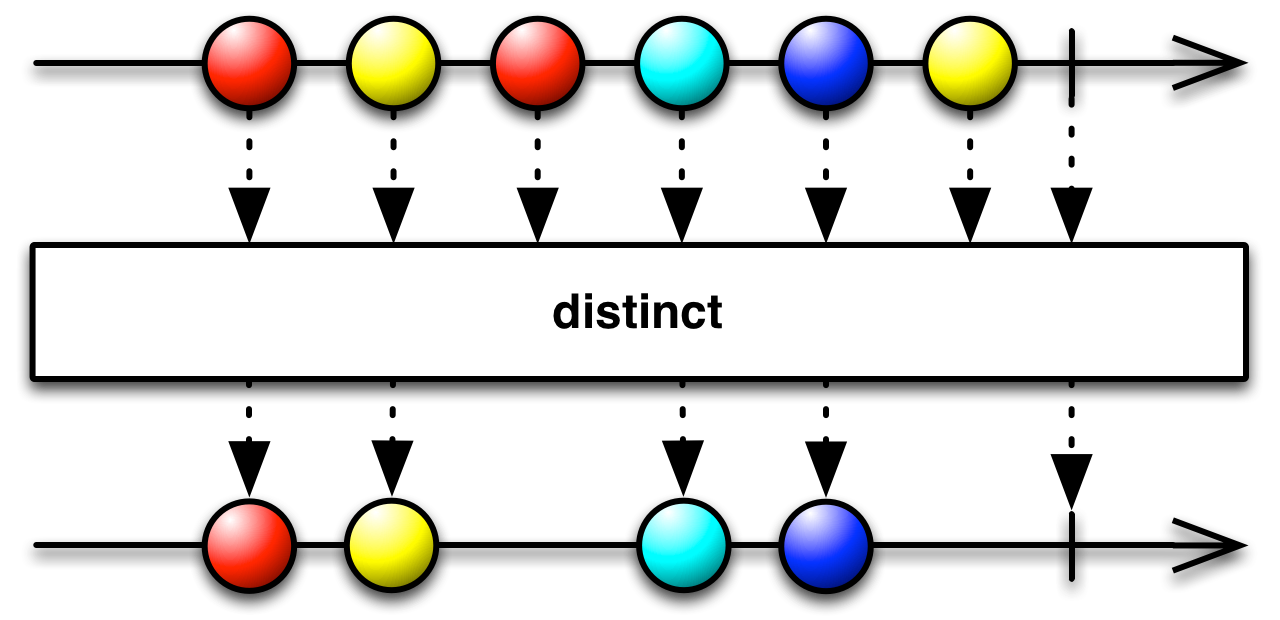
Observable.just(1,2,3,1,2,3,4)
.distinct()
.subscribe(System.out::println)
//결과
//1
//2
//3
//4First, Last
- First와 Last는 발행된 데이터의 첫번째와 마지막 값을 받는 필터링 operator이다
- 해당 메서드를 사용하는데 있어 조건에 만족시키는 값이 없을 수 있으므로 default값을 넣어야 한다.
- 또한 발행된 값이 하나가 나오는 것을 보장하기에 해당 Ovservable은
Single이 된다.

Observable.just(1,2,3,4,5,6,7,8,9)
.filter { it -> it % 2 == 0 }
.first(0)
.subscribe({
println("onSuccess = ${it}"
},{
println("onError = ${it}")
})
//결과
//onSuccess = 2해당 subscribe는 public final Disposable subscribe(@NonNull Consumer<? super T> onSuccess, @NonNull Consumer<? super Throwable> onError)로 정의되어 있다.
- 또한 single의 subscribe에는 다음 오버로딩 메서드가 존재한다.
public final Disposable subscribe(@NonNull Consumer<? super T> onSuccess)
public final Disposable subscribe(@NonNull BiConsumer<? super T, ? super Throwable> onCallback)- subscribe의 매개변수가 하나이기 때문에 람다식으로 사용하게 될 경우 명시적으로 함수형 인터페이스의 매개변수를 지정해줘야 한다.
Take, Skip
- Take(N)는 Observable에서 발행된 N개의 값만을 발행
- TakeLast(N)는 Observable에서 마지막 N개의 값만을 발행
- Skip(N)은 Observable에서 발행된 최초 N개를 제외하고 발행
- SkipLast(N)은 Observable에서 발행된 마지막 N개를 제외하고 발행

Observable.just(1, 2, 3, 4, 5, 6, 7, 8, 9)
.filter { it % 2 == 0 }
.take(2)
.subscribe { it
println("onNext = ${it}")
}
//결과
//onNext = 2
//onNext = 4Map
- 발행된 각 항목에 함수를 적용시켜 변환하는 메서드

Observable.just(1,2, 3, 4, 5)
.map { it -> it * 10}
.subscribe {
println("onNext = ${it}")
}
//결과
//onNext = 10
//onNext = 20
//onNext = 30
//onNext = 40
//onNext = 50FlatMap, ConcatMap
- FlatMap은 Observable에서 발행된 항목을을 다시 새로운 Single Observable로 항목들을 발행하게 된다.
- 새로운 Single Observable로 발행된 데이터들은 순서를 보장받지 못한다.
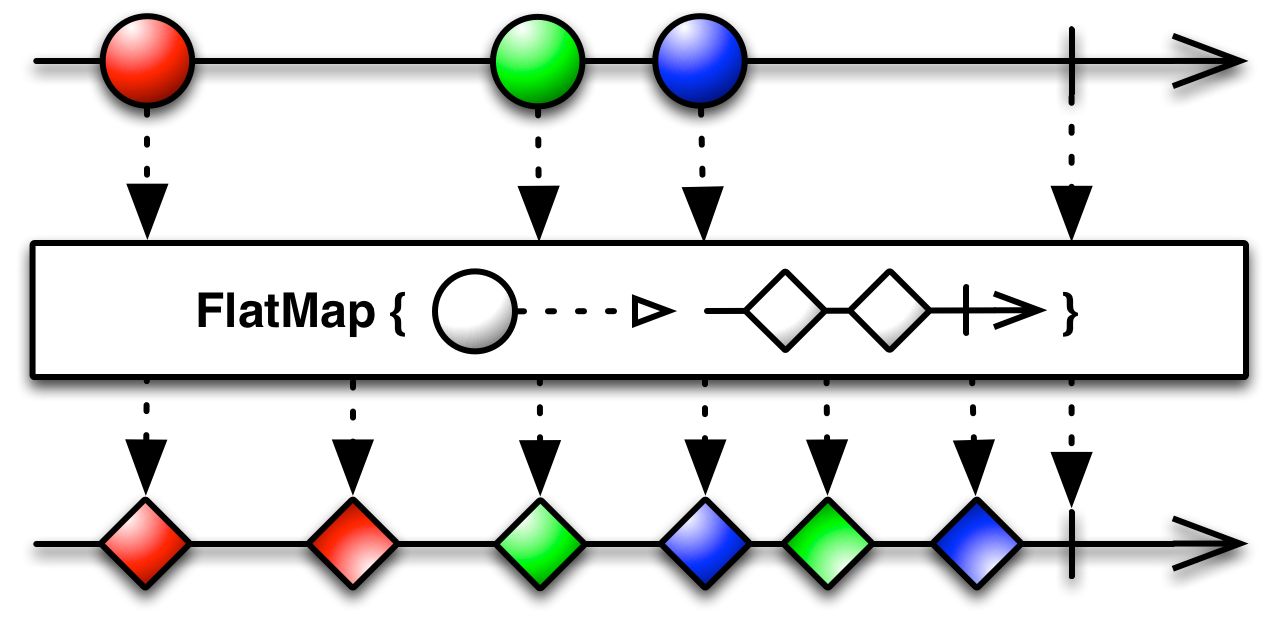
Observable.just("1","2","3","4","5")
.flatMap { value: String ->
Observable.interval(200, TimeUnit.MILLISECONDS)
.map { cnt: Long -> "$value nowCnt = $cnt" }
.take(2)
}
.subscribe {
println("onNext = ${it}")
}
//결과
//onNext = 3 nowCnt = 0
//onNext = 1 nowCnt = 0
//onNext = 2 nowCnt = 0
//onNext = 4 nowCnt = 0
//onNext = 5 nowCnt = 0
//onNext = 1 nowCnt = 1
//onNext = 2 nowCnt = 1
//onNext = 3 nowCnt = 1
//onNext = 4 nowCnt = 1
//onNext = 5 nowCnt = 1- flatMap내부에 새로운 Observable을 이용하여 200ms주기 마다 정수를 발행하는 값을 value에 붙였다.
- 또한 출력 결과는 순서를 보장하지 않는다는 것을 확인 할 수 있다.
- 대신
concatMap을 사용하여 순서를 보장할 수 있지만 성능은 flatMap에 비해 떨어진다. - 또한
concatMap에 여러 Observable이 사용되면 다음과 같이 병합되지 않고 연결된다.
Debounce
- 특정시간 범위에서의 항목을 방출하지 않고 범위를 경과한 값을 방행한다.
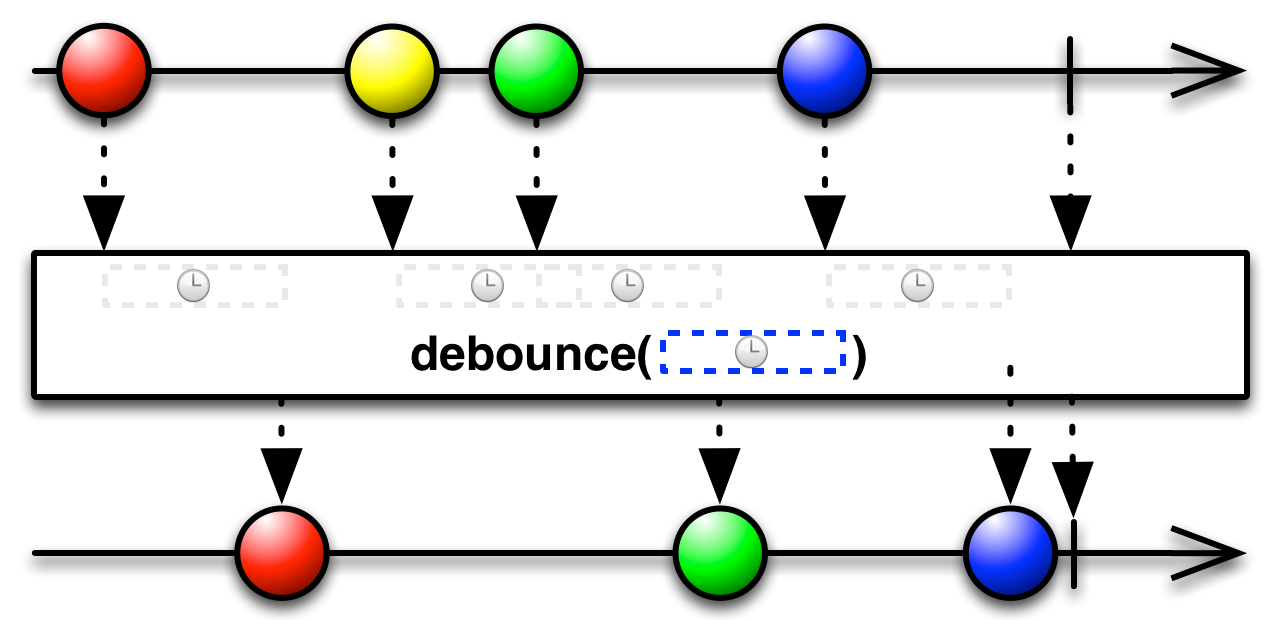
Observable.interval(105, TimeUnit.MILLISECONDS)
.take(5)
.debounce(100, TimeUnit.MILLISECONDS)
.subscribe(System.out::println)
//결과 (매번바뀜)
//1
//3
//4- 105ms간격마다 데이터를 입력하고 발행 시점에서 100ms가 지나면 해당값을 출력하게 된다.
- 5ms의 미세한 오차를 두어 몇몇 데이터가 출력되지 않음을 볼 수 있다.
- 이를 안드로이드에서 키보드 입력을 받을때 매번 새로운 입력이 들어올때마다 로직을 수행하는 것이아닌 debounce를 사용해 키보드 입력이 끝난 몇 ms후 로직을 수행할 수 있다.
Scan
- Scan은 순차적으로 함수를 적용하여 연속적으로 값을 방출한다.
- Java Stream의 Reduce와 같은 역할을 수행하는데 Scan은 순차적으로 처리된 값을 출력해준다.

Observable.just("a","b","c","d","e")
.scan { now, next ->
"${now} -> ${next}"
}
.subscribe(System.out::println)
//결과
//a
//a -> b
//a -> b -> c
//a -> b -> c -> d
//a -> b -> c -> d -> e- 순차적으로 발행된 값이 처리되는 과정을 알 수 있게 된다.
연산
Reduce
- 발행된 모든 데이터를 순차적으로 함수에 적용하고 최종값 하나를 발행한다.
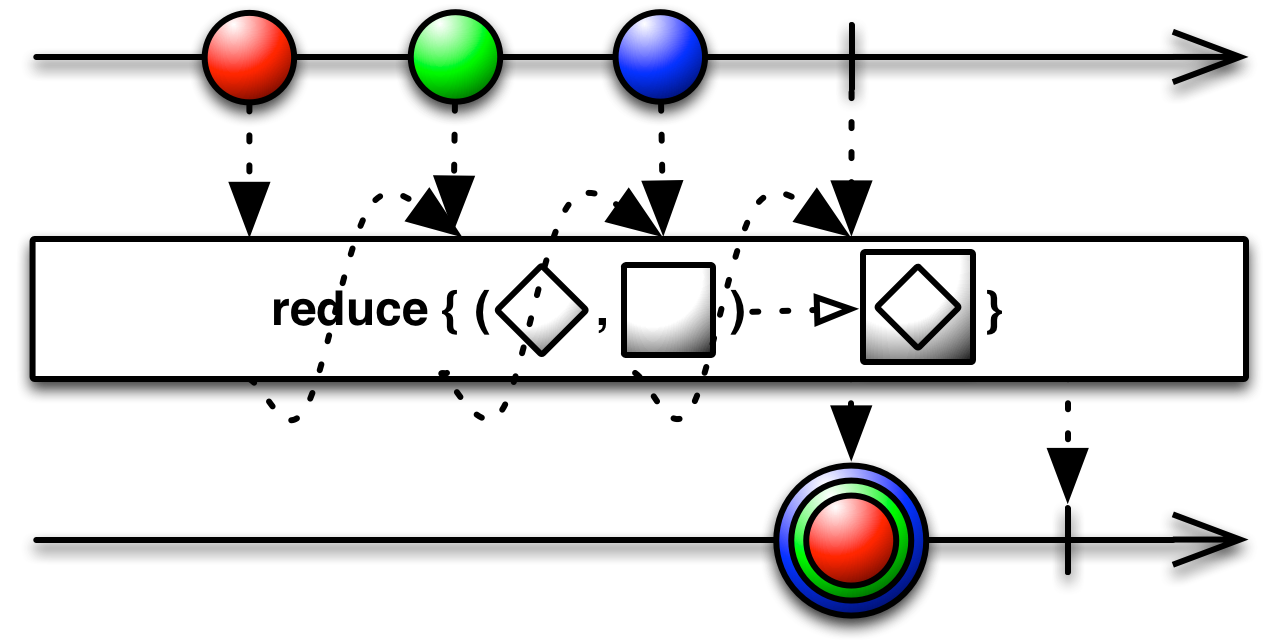
Observable.just("a","b","c","d","e")
.reduce { now, next ->
"${now} -> ${next}"
}
.subscribe(System.out::println)
//결과
//a -> b -> c -> d -> e- Scan과 다르게 한번에 출력만을 보여준다.
Concat
- 두 개 이상의 Observable을 발행되는 데이터를 중간에 섞이지 않고 순차적으로 발행시킨다.
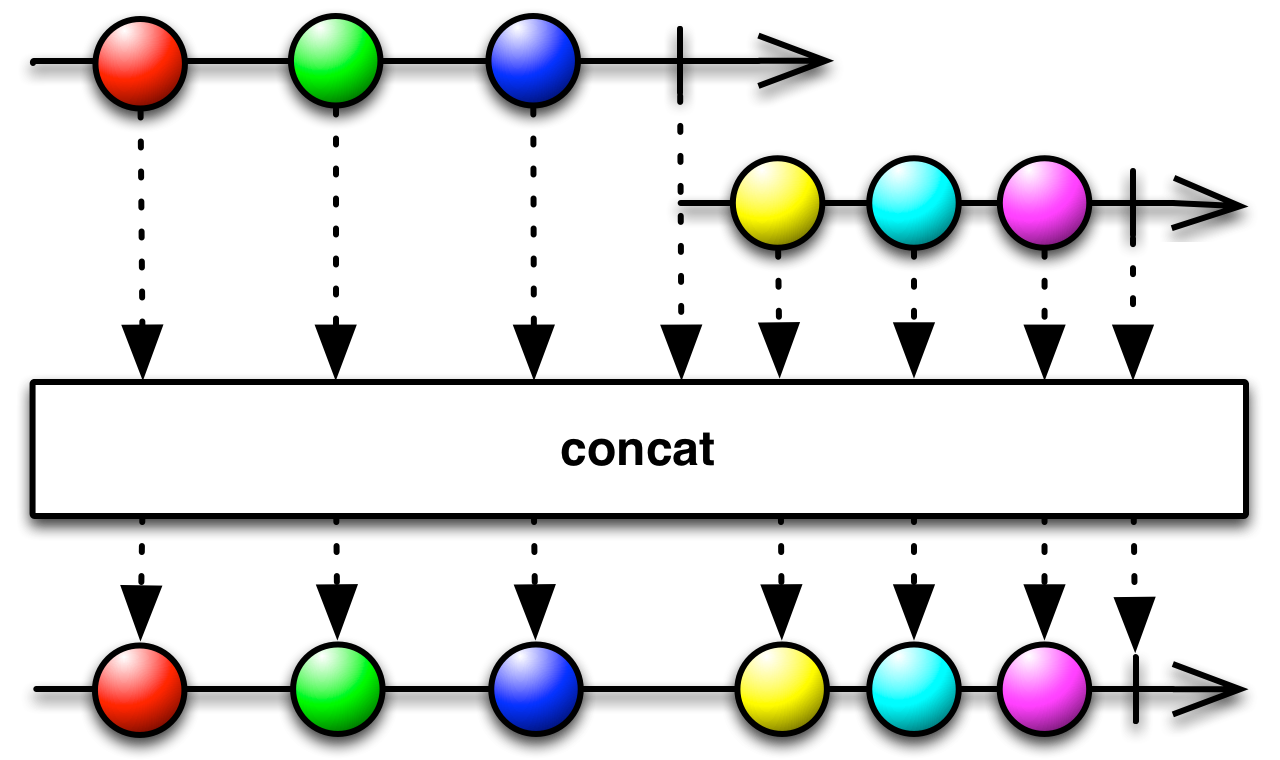
val observable1 = Observable.interval(0, 100, TimeUnit.MILLISECONDS)
.map { "observable1 = $it" }
.take(5)
val observable2 = Observable.interval(0, 200, TimeUnit.MILLISECONDS)
.map { "observable2 = $it" }
.take(5)
Observable.concat(observable1, observable2)
.subscribe(System.out::println)
//결과
//observable1 = 0
//observable1 = 1
//observable1 = 2
//observable1 = 3
//observable1 = 4
//observable2 = 0
//observable2 = 1
//observable2 = 2
//observable2 = 3
//observable2 = 4결합
Zip
- 지정된 기능을 통해 최소2개, 최대9개 Observable을 결합하여 순차적인 결합에 의해 데이터를 발행한다.

val observable1 = Observable.just(1,2,3,4,5,6,7)
val observable2 = Observable.just("a","b","c")
Observable.zip(observable1, observable2, BiFunction { obs1, obs2 ->
return@BiFunction "$obs1 + $obs2"
}).subscribe(System.out::println)
//결과
//1 + a
//2 + b
//3 + c- Zip의 특성상 순차적인 결합으로 observable1의 남은 데이터 4,5,6,7은 결합될 observable이 없어 출력되지 않는다.
CombineLatest
- 두 개의 Observable 중 하나의 데이터가 발행되는 경우 지정된 함수를 통해 각 Observable에서 발행된 최신데이터와 결합하여 이를 발행한다.
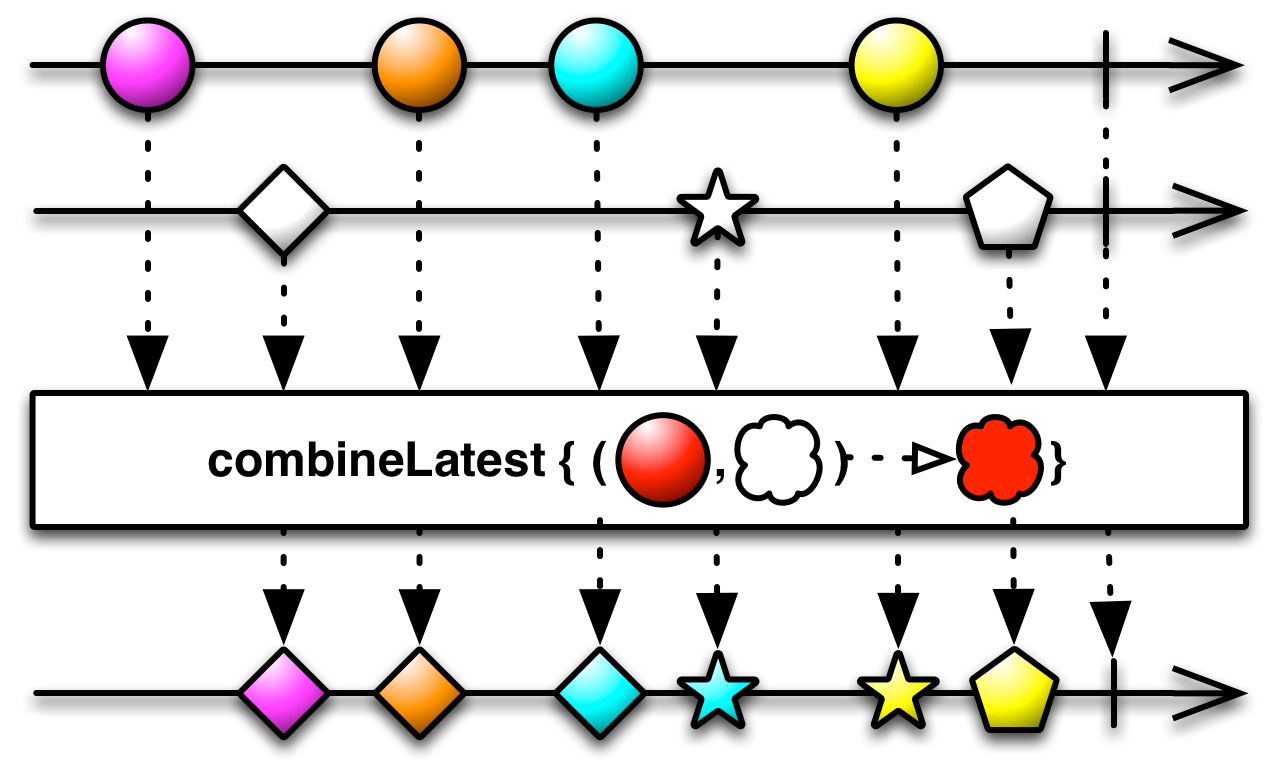
val list1 = mutableListOf(1,2,3,4,5,6,7,8,9)
val list2 = mutableListOf("dog","cat","elephant", "human","thanos","deer")
val observable1 = Observable.fromIterable(list1)
.zipWith(Observable.interval(200, TimeUnit.MILLISECONDS), BiFunction { int, time ->
return@BiFunction int
})
val observable2 = Observable.fromIterable(list2)
.zipWith(Observable.interval(150, 200, TimeUnit.MILLISECONDS), BiFunction { str, time ->
return@BiFunction str
})
Observable.combineLatest(observable1, observable2, BiFunction { obs1, obs2 ->
return@BiFunction "$obs1 + $obs2"
}).subscribe(System.out::println)
//결과
//1 + dog
//1 + cat
//2 + cat
//2 + elephant
//3 + elephant
//3 + human
//4 + human
//4 + thanos
//5 + thanos
//5 + deer
//6 + deer
//7 + deer
//8 + deer
//9 + deer- observable1이 값을 발행하고 observable2가 150ms 늦게 시작하게 된다.
- 약간의 차이로 최근에 발행된 값과 함께 출력됨을 알 수 있다.
Merge
- 여러 Observable를 하나의 발행으로 결합시킨다.
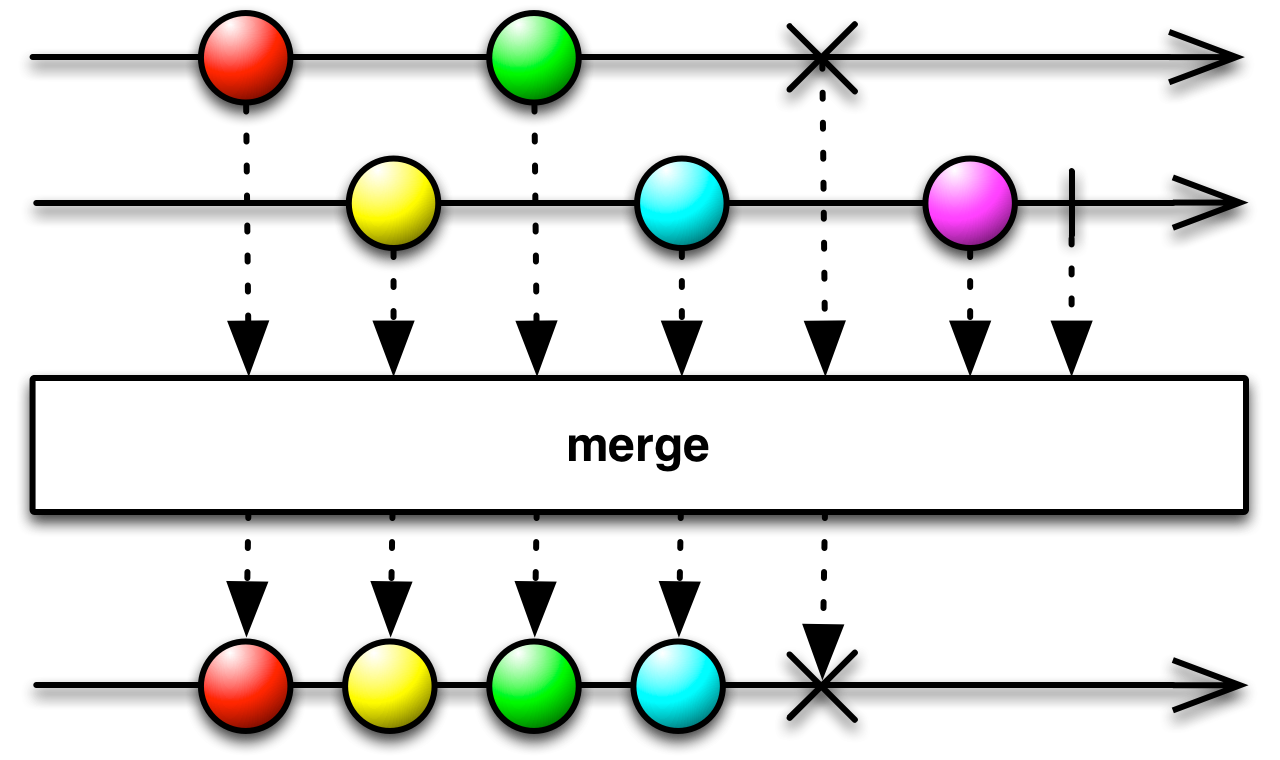
val observable1 = Observable.interval(0, 100, TimeUnit.MILLISECONDS)
.map { "observable1 = $it" }
.take(5)
val observable2 = Observable.interval(0, 200, TimeUnit.MILLISECONDS)
.map { "observable2 = $it" }
.take(5)
Observable.merge(observable1, observable2)
.subscribe(System.out::println)
//결과
//observable1 = 0
//observable2 = 0
//observable1 = 1
//observable1 = 2
//observable2 = 1
//observable1 = 3
//observable2 = 2
//observable1 = 4
//observable2 = 3
//observable2 = 4상태 및 boolean
All
- Observable에서 발행되는 모든 데이터가 조건을 만족시키는 확인

Observable.just("a", "b", "c", "d", "e", 5)
.all { it is String }
.subscribe({
if (it == true) println("all is String type")
else println("there are another type")
}, {
println("error")
})
//결과
//there are another type- all의 매개변수는
Predicate이므로 결과가boolean타입으로 반환되고 이는 1개의 값만을 발행하는 것을 보장하기 때문에Single을 반환한다.
Amb
- 둘 이상의 Observable이 주어지면 그 중 첫 번째로 발행된 Observable만을 발행한다.

val observable1 = Observable.interval(100, TimeUnit.MILLISECONDS).take(3).map { "observable1 = $it" }
val observable2 = Observable.interval(50, TimeUnit.MILLISECONDS).take(3).map { "observable2 = $it" }
val observable3 = Observable.interval(0,100, TimeUnit.MILLISECONDS).take(3).map { "observable3 = $it" }
val list = listOf(observable1, observable2, observable3)
Observable.amb(list).subscribe(System.out::println)
//결과
//observable3 = 0
//observable3 = 1
//observable3 = 2- observable3은 최초 딜레이 없이 곧바로 값을 발행하여 observable3의 데이터만 발행하게 된다.
TakeUntil
- 두 번째 Observable에서 발행데이터를 받게 되면 모든 항목을 삭제하고 발행을 멈춘다.
- 만약 두 번재 발행이 첫 번째 발행과 겹치게 되면 출력하고 발행을 중지한다.
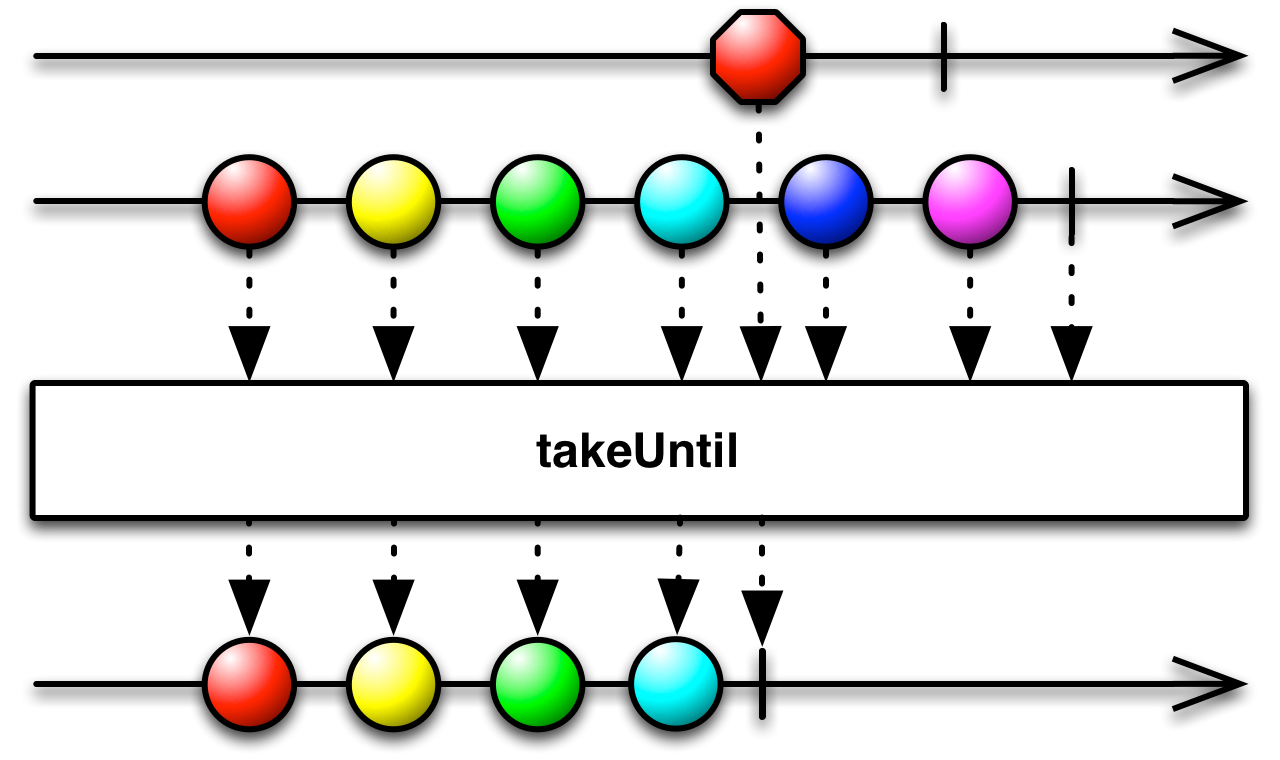
Observable.interval(100, TimeUnit.MILLISECONDS)
.map { "observable = $it" }
.takeUntil(Observable.timer(500, TimeUnit.MILLISECONDS))
.subscribe(System.out::println)
//결과
//observable = 0
//observable = 1
//observable = 2
//observable = 3SkipUntil
- TakeUntil과 다르게 두번째 Observable에서 발행된 이후 데이터를 발행하게 된다.
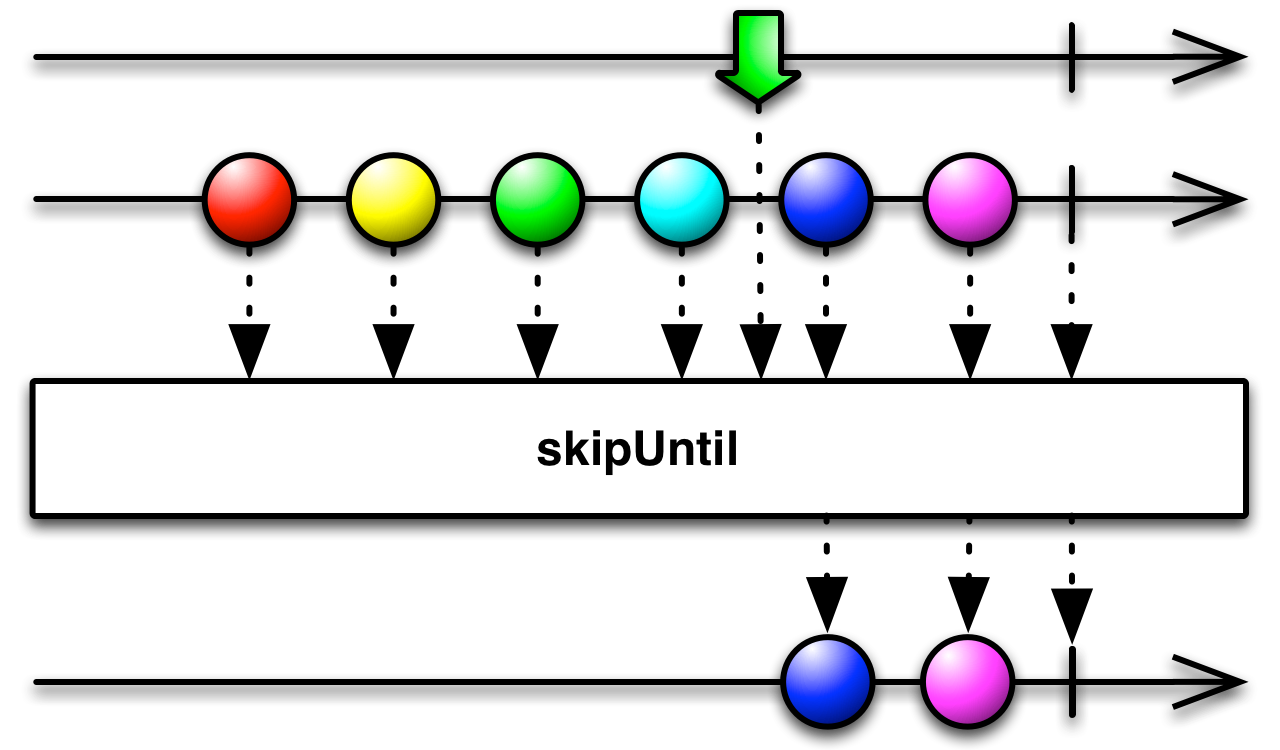
Observable.interval(100, TimeUnit.MILLISECONDS)
.take(10)
.skipUntil(Observable.timer(500, TimeUnit.MILLISECONDS))
.subscribe(System.out::println)
//결과
//5
//6
//7
//8
//9Scheduler
- 일반적으로 Observable를 호출하는 Thread에서 동작한다.
interval,timer로 생성된 Observable은 계산 Scheduler인 Computation을 사용함
- Scheduler는 Observable의 Thread를 지정해주는 역할을 한다.
- 데이터의 흐름을 발생시키는 스레드를
subscribeOn로 지정 - 전달받은 데이터를 처리하는 스레드를
observeOn로 지정
Schedulers
Schdulers.io
- I/O 처리와 같은 DB, 네트워크작업을 위한 scheduler이다.
- 캐쉬된 스레드가 있을시 재활용하고 필요에 따라 스레드풀에서 생성된다.
- 일반적인 계산작업에는 Schedulers.computation을 사용해야한다.
val observable = Observable.just(1,2,3)
observable
.subscribeOn(Schedulers.io())
.subscribe {
println("1. ${Thread.currentThread().name} is working, value is ${it}")
}
observable
.subscribeOn(Schedulers.io())
.subscribe {
println("2. ${Thread.currentThread().name} is working, value is ${it}")
}
//결과
//2. RxCachedThreadScheduler-2 is working, value is 1
//1. RxCachedThreadScheduler-1 is working, value is 1
//1. RxCachedThreadScheduler-1 is working, value is 2
//2. RxCachedThreadScheduler-2 is working, value is 2
//1. RxCachedThreadScheduler-1 is working, value is 3
//2. RxCachedThreadScheduler-2 is working, value is 3- 메인스레드에서 호출하여 캐쉬된 스레드를 사용하여 비동기적으로 처리한다.
Schedulers.computation
- 이벤트 처리 및 콜벡 처리와 같은 계산 작업에 사용한다.
- I/O처리에서 사용하면 안된다.
- 기본적으로 스레드의 수는 프로세서와 일치한다.
val observable = Observable.interval(100, TimeUnit.MILLISECONDS).take(3)
observable
.subscribeOn(Schedulers.io())
.subscribe {
println("1. ${Thread.currentThread().name} is working, value is ${it}")
}
//결과
//1. RxComputationThreadPool-1 is working, value is 0
//1. RxComputationThreadPool-1 is working, value is 1
//1. RxComputationThreadPool-1 is working, value is 2
//1. RxComputationThreadPool-1 is working, value is 3
//1. RxComputationThreadPool-1 is working, value is 4- 메인스레드에서 생성하고 Schduler를 io로 지정해주었지만 ComputationThreadPool의 스레드를 사용하는 것을 확인할 수 있다.
- 이는
interval,timer로 Obversable를 생성하면 scheduler가 자동적으로 computation으로 바뀐다.
Schedulers.newThread
- 작업마다 새로운 스레드를 생성한다.
val observable = Observable.just(1,2,3)
observable
.subscribeOn(Schedulers.newThread())
.subscribe {
println("1. ${Thread.currentThread().name} is working, value is ${it}")
}
observable
.subscribeOn(Schedulers.newThread())
.subscribe {
println("2. ${Thread.currentThread().name} is working, value is ${it}")
}
//결과
//1. RxNewThreadScheduler-1 is working, value is 1
//1. RxNewThreadScheduler-1 is working, value is 2
//1. RxNewThreadScheduler-1 is working, value is 3
//2. RxNewThreadScheduler-2 is working, value is 1
//2. RxNewThreadScheduler-2 is working, value is 2
//2. RxNewThreadScheduler-2 is working, value is 3- 메인스레드에서 호출했고 새롭게 스레드를 생성하여 각 작업을 비동기적으로 처리한다.
Schedulers.single
- singleThreadPool을 사용하고 해당 Scheduler로 여러 작업을 수행하면 Queuing되어 순서가 보장
val observable = Observable.just(1,2,3)
observable
.subscribeOn(Schedulers.single())
.subscribe {
println("1. ${Thread.currentThread().name} is working, value is ${it}")
}
observable
.subscribeOn(Schedulers.single())
.subscribe {
println("2. ${Thread.currentThread().name} is working, value is ${it}")
}
//결과
//1. RxSingleScheduler-1 is working, value is 1
//1. RxSingleScheduler-1 is working, value is 2
//1. RxSingleScheduler-1 is working, value is 3
//2. RxSingleScheduler-1 is working, value is 1
//2. RxSingleScheduler-1 is working, value is 2
//2. RxSingleScheduler-1 is working, value is 3- 메인스레드에서 호출했지만 SingleScheduler로써 순서가 보장되고 비동기처리가 가능해진다.
Schedulers.trampoline
- 호출한 스레드에서 작업을 수행하고 해당 스레드에서 다른 작업을 수행하면 Queuning되어 순서가 보장된다.
val observable = Observable.just(1,2,3)
observable
.subscribeOn(Schedulers.trampoline())
.subscribe {
println("1. ${Thread.currentThread().name} is working, value is ${it}")
}
observable
.subscribeOn(Schedulers.trampoline())
.subscribe {
println("2. ${Thread.currentThread().name} is working, value is ${it}")
}
//결과
//1. main is working, value is 1
//1. main is working, value is 2
//1. main is working, value is 3
//2. main is working, value is 1
//2. main is working, value is 2
//2. main is working, value is 3- 메인스레드에서 호출했기 때문에 스레드는 mainThread가 되고 순차적으로 처리된다.
Scheduler 지정
- subscribeOn : 작업을 처리할 스레드 지정
- observeOn : 작업결과를 처리할 스레드 지정
SubscribeOn
- 작업을 처리할 스레드를 지정하는 연산자이다.
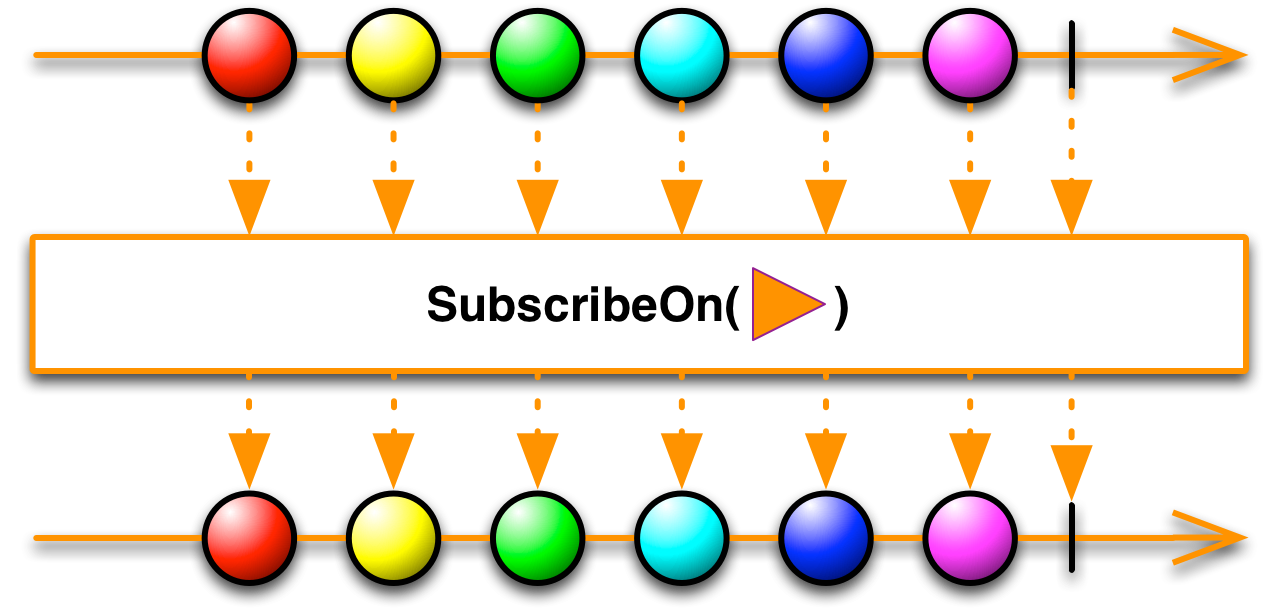
- observeOn 연산자를 사용하지 않는다면 선언 위치에 무관하게 Observable, Observer모두 subscribeOn에서 지정한 scheduler를 사용한다.
ObserveOn
- observe의 scheduler를 지정하는 연산자이다.
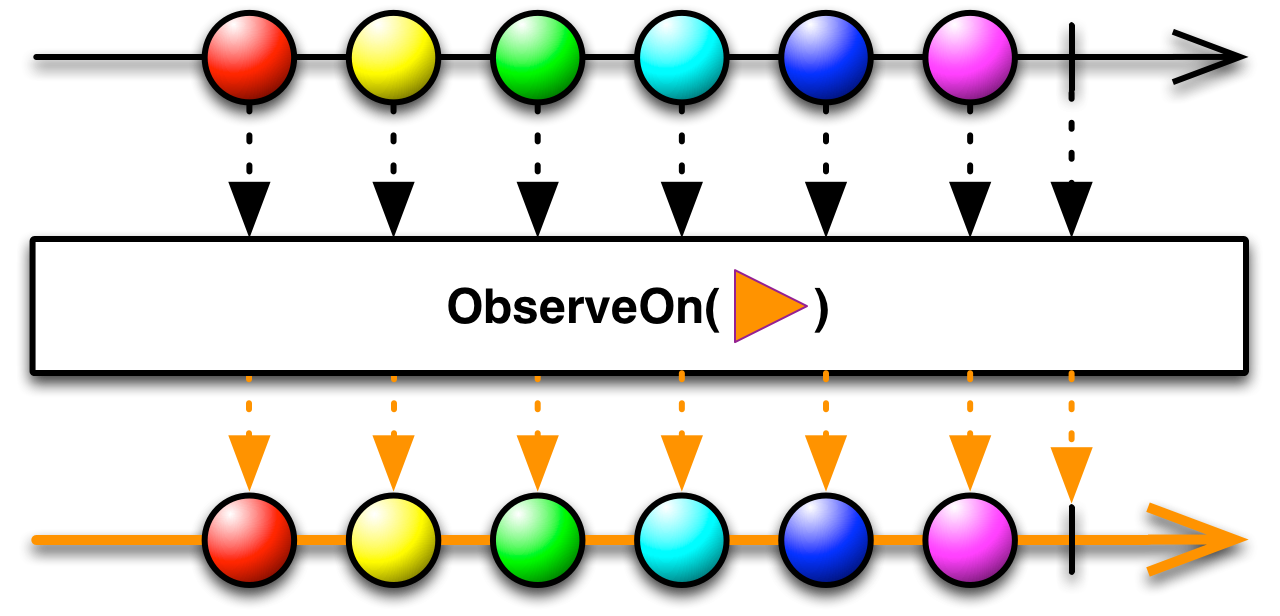
- subscribeOn과 비슷하지만, Observable 객체에 지정된 scheduler에서 작동하도록 지정하고 해당 scheduler에 대한 관찰자에게 알려준다.
subscribeOn과 observeOn의 우선순위
-
기본적으로 Observable과 사용자가 지정한 연산자 체인의 작업을 수행하고 subscribe 메서드에 대해 관찰자에게 알린다.
-
SubscribeOn연산자는 Observable이 작동해야 하는 다른 Scheduler를 지정하여 작동 스레드를 변경한다.
-
observeOn연산자는 Observable가 observe에게 변경사항을 보내는데 다른 scheduler를사용하게끔 만들것이다.
-
다음 이미지를 통해 subscribeOn과 observeOn의 우선순위에 대해 알수 있다.
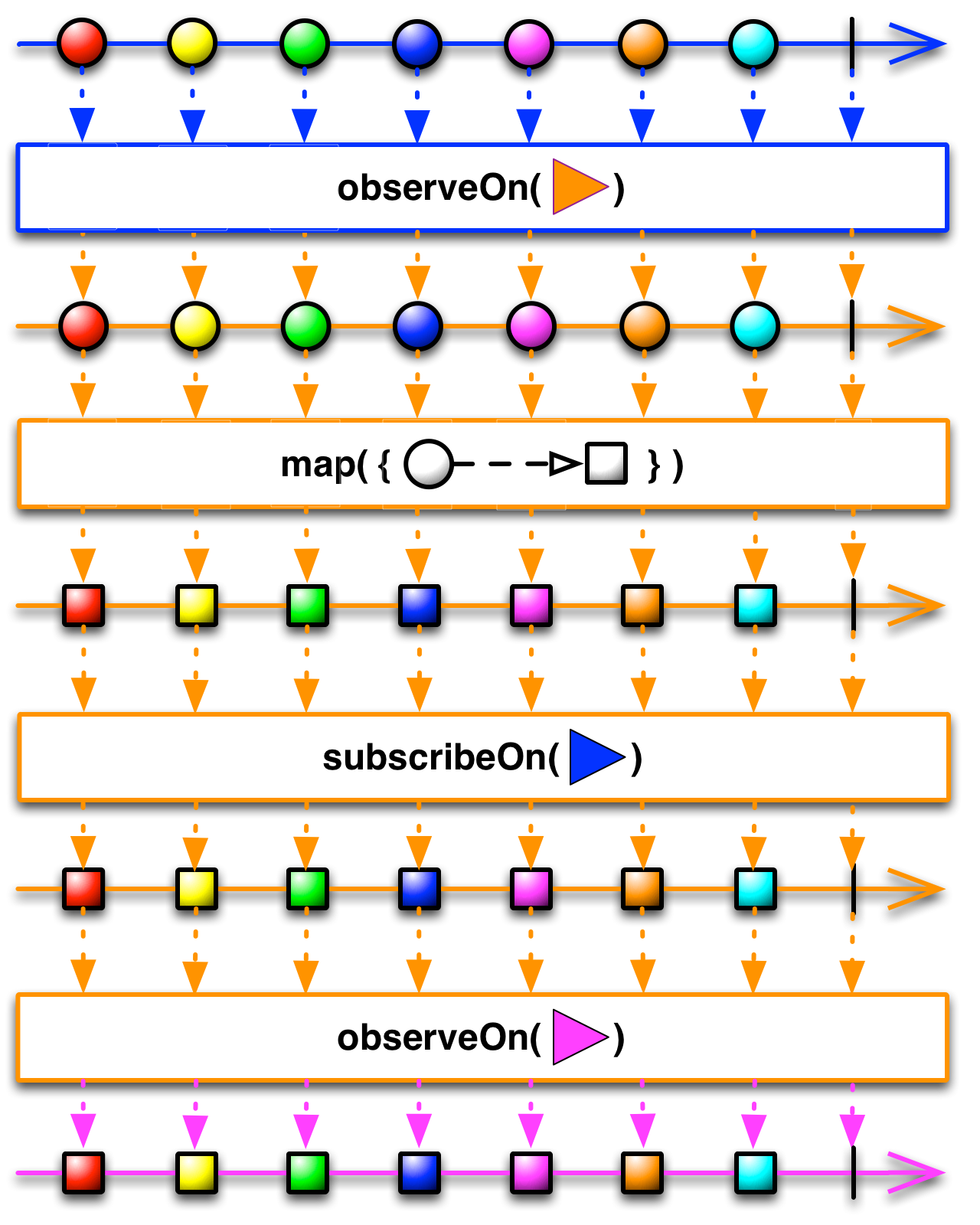
- SubscribeOn 연산자는 Observable가 어느 Thread에서 작동 시작할지를 지정한다.
- SubscribeOn연산자는 위치에 상관없이 Ovservable의 시작 스레드를 지정할 수 있다.
- 반변에 ObserveOn은 Observable에서 사용된 시점아래 부터 지속적으로 스레드에 영향을 미친다.
- 첫번재 observeOn연산자가 수행된 이후 지속적으로
주황색 Scheduler를 사용되고 마지막에보라색 Scheduler로 변형되었다.
- 첫번재 observeOn연산자가 수행된 이후 지속적으로
- 이러한 것을 통해 Observable에 연산자를 연속적으로 사용하는 과정에서 ObserveOn 연산자를 여러번 호출하여 특정 Thread가 특정 작업을 수행할 수 있도록 할 수 있다.
subscribeOn 연산자의 경우 여러번 호출가능하지만 가장 먼저 선언된 Scheduler를 사용하게 된다.
Debuging & Exception
- Reactive Programming에서는 try-catch문을 사용할 수 없기 때문에 doOnXXX 연산자를 이용하여 처리해야 한다.
doOnNext, doOnError, doOnComplete
- doOn 연산자가 먼저 실행됨을 알 수 있다.
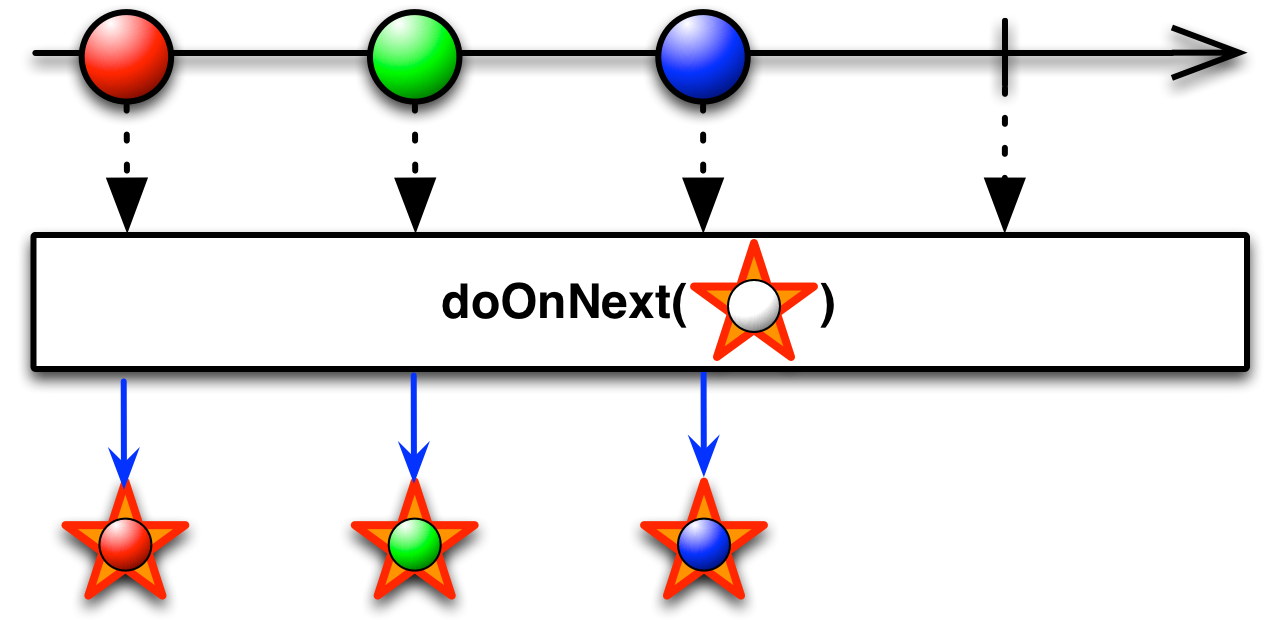
Observable.just(0, 1, 2)
.doOnNext { println("doOnNext = $it") }
.doOnComplete { println("doOnComplete") }
.doOnError { println("doOnError") }
.subscribe({
println("onNext = $it")
}, {
println("onError = $it")
}, {
println("onComplete")
})
//결과
//doOnNext = 0
//onNext = 0
//doOnNext = 1
//onNext = 1
//doOnNext = 2
//onNext = 2
//doOnComplete
//onCompleteObservable.just(0, 1, 2)
.map { it % 0 }
.doOnNext { println("doOnNext = $it") }
.doOnComplete { println("doOnComplete") }
.doOnError { println("doOnError") }
.subscribe({
println("onNext = $it")
}, {
println("onError = $it")
}, {
println("onComplete")
})
//결과
//doOnError
//onError = java.lang.ArithmeticException: / by zerodoOnSubscribe, doOnDispose
- subscribe호출과 dispose 메서드를 사용시 처리될 로직을 수행할 수 있다.
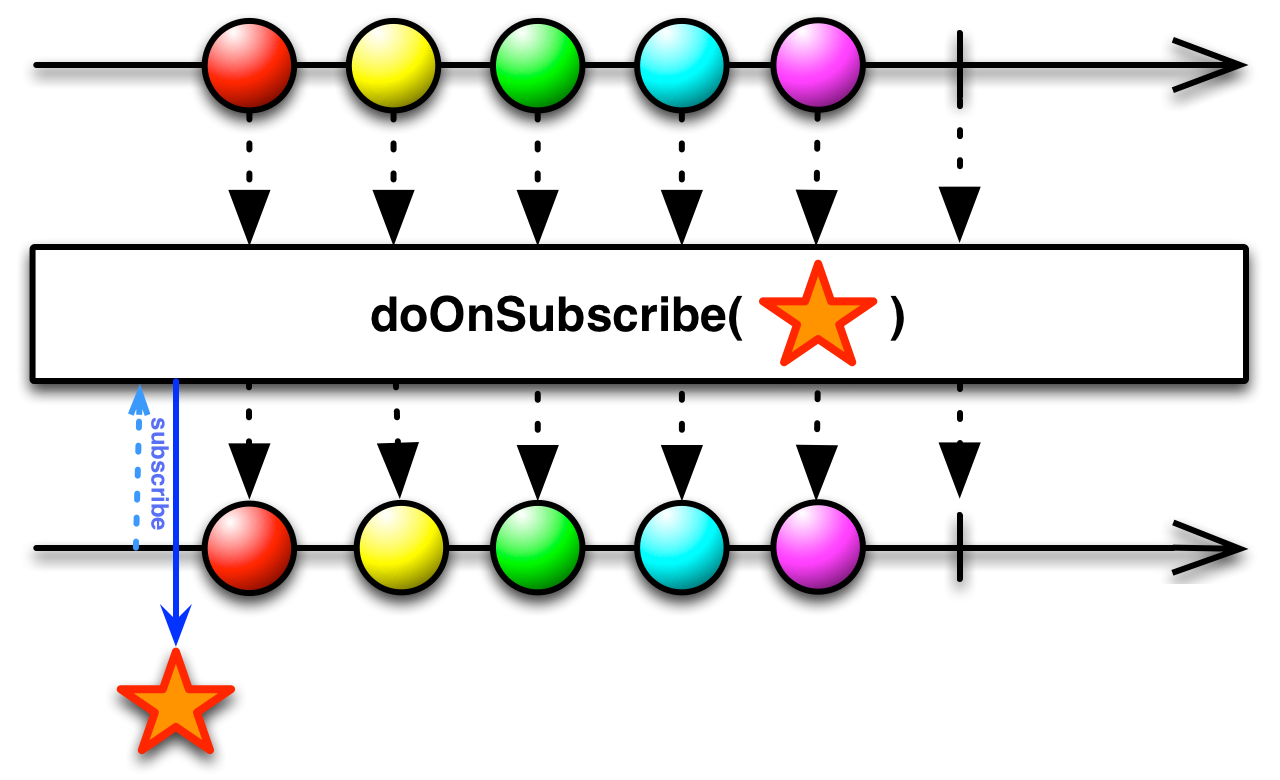
val dispose = Observable.interval(100, TimeUnit.MILLISECONDS)
.doOnSubscribe { println("doOnSubscribe") }
.doOnDispose { println("doOnDispose") }
.subscribe({
println("onNext = $it")
}, {
println("onError = $it")
}, {
println("onComplete")
})
Thread.sleep(500)
dispose.dispose()
//결과
//doOnSubscribe
//onNext = 0
//onNext = 1
//onNext = 2
//onNext = 3
//onNext = 4
//doOnDisposeonErrorReturn
- error가 발생했을때의 값을 다른 값으로 매핑하여 예외를 처리할 수 있다.
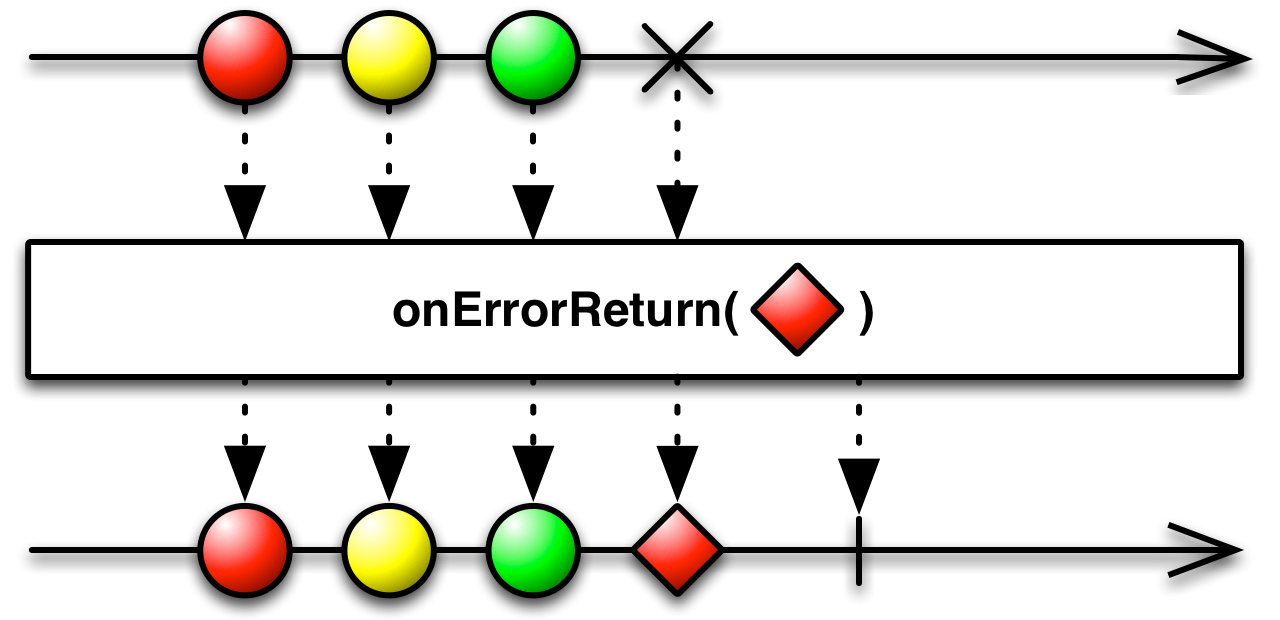
val list = mutableListOf("0", "1", "2","T3", "4")
Observable.fromIterable(list)
.map{Integer.parseInt(it)}
.onErrorReturn {
println("error => $it")
return@onErrorReturn -1
}
.subscribe {
println("onNext = $it")
}
//결과
//onNext = 0
//onNext = 1
//onNext = 2
//error => java.lang.NumberFormatException: For input string: "T3"
//onNext = -1- onErrorReturnItem을 이용하여 Throwable을 받지 않고 곧바로 값을 넘길 수 있다.
Retry
- Observable에서 오류를 발생한다면 오류가 발생되지 않을 때까지 다시 수행한다.
- 일반적으로 네트워크 요청처리 실패시 사용될 수 있다.
val observable = Observable.range(0, 10)
.map {
if (it == 3) throw Exception("error")
else it
}
observable.retry(2).subscribe({
println("onNext = $it")
},{
println("onError = $it")
})
//결과
//onNext = 0
//onNext = 1
//onNext = 2
//onNext = 0
//onNext = 1
//onNext = 2
//onNext = 0
//onNext = 1
//onNext = 2
//onError = java.lang.Exception: error참고 :
